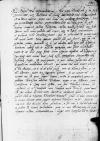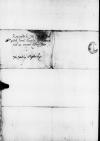Iam prope biennium est, quod in aula Charles V of Habsburg (*1500 – †1558), ruler of the Burgundian territories (1506-1555), King of Spain as Charles I (1516-1556), King of Naples and Sicily, King of the Romans (1519-1530), Holy Roman Emperor of the German Nation (elected 1519, crowned 1530, abdicated 1556); son of Philip I the Handsome and Joanna the Mad of Castile⌊caesarisCharles V of Habsburg (*1500 – †1558), ruler of the Burgundian territories (1506-1555), King of Spain as Charles I (1516-1556), King of Naples and Sicily, King of the Romans (1519-1530), Holy Roman Emperor of the German Nation (elected 1519, crowned 1530, abdicated 1556); son of Philip I the Handsome and Joanna the Mad of Castile⌋ ago,
neque hactenus tamen quisquam sese obtulit, cui litterarum written over s⌈srumrum written over s⌉ aliquid ad te dare possem, praeter unum hunc tuum quondam familiarem. Cuius ego opportunitatem nactus, praetermittere omnino non volui, quin te post tantum temporis saltem salutarem. Nam multa scribendi neque satis liberum mihi nunc quidem est otium, neque te dignum argumentum; et prolixius scribit Ioannes Secundus (Janus Everardi) (*1511 – †1536), Dutch humanist, neo-Latin poet, doctor of both canon and civil laws, eminent carver of medals; 1534-1535 secretary of Cardinal Juan Pardo de Tavera, Archbishop of Toledo, 1535-1536 secretary of George van Egmond, Bishop of Utrecht (POCIECHA 4, p. 260)⌊SecundusIoannes Secundus (Janus Everardi) (*1511 – †1536), Dutch humanist, neo-Latin poet, doctor of both canon and civil laws, eminent carver of medals; 1534-1535 secretary of Cardinal Juan Pardo de Tavera, Archbishop of Toledo, 1535-1536 secretary of George van Egmond, Bishop of Utrecht (POCIECHA 4, p. 260)⌋ frater; qui et querelam de optimi Nicolaus Everardi (Nicolaas Everaerts) (*ca. 1461 – †1532), father of the neo-Latin poets Ioannes Secundus, Nicolaus Grudius and Hadrianus Marius; 1509-1528 president of the council of Holland, since 1528 president of the grand council of Mechelen (CE, vol. 2, p. 446-448)⌊patrisNicolaus Everardi (Nicolaas Everaerts) (*ca. 1461 – †1532), father of the neo-Latin poets Ioannes Secundus, Nicolaus Grudius and Hadrianus Marius; 1509-1528 president of the council of Holland, since 1528 president of the grand council of Mechelen (CE, vol. 2, p. 446-448)⌋ nostri morte mittit. Non ignoras, qualis ille Nicolaus Everardi (Nicolaas Everaerts) (*ca. 1461 – †1532), father of the neo-Latin poets Ioannes Secundus, Nicolaus Grudius and Hadrianus Marius; 1509-1528 president of the council of Holland, since 1528 president of the grand council of Mechelen (CE, vol. 2, p. 446-448)⌊virNicolaus Everardi (Nicolaas Everaerts) (*ca. 1461 – †1532), father of the neo-Latin poets Ioannes Secundus, Nicolaus Grudius and Hadrianus Marius; 1509-1528 president of the council of Holland, since 1528 president of the grand council of Mechelen (CE, vol. 2, p. 446-448)⌋ fuerit, neque ipsa etiam posteritas, opinor, ignorabit. Quod si, ut nuntiatum nobis saepe est, insignium hominum undique abs te collecta epitaphia una edere constituisti, quaeso te, ut huic quoque querelae locum aliquem concedere ne dedigneris.
Ego quoque ante annos duos aulae iussu, epitaphium Margaret of Austria (*1480 – †1530), 1501-1504 Duchess of Savoy, 1507-1515 and 1519-1530 Governor of the Habsburg Netherlands; daughter of Emperor Maximilian I of Habsburg and Mary of Burgundy⌊MargaretaeMargaret of Austria (*1480 – †1530), 1501-1504 Duchess of Savoy, 1507-1515 and 1519-1530 Governor of the Habsburg Netherlands; daughter of Emperor Maximilian I of Habsburg and Mary of Burgundy⌋ nostrae Austriacae scripsi, sed praecipitanter, et paene biduo, cum iam esset in Burgundian Netherlands (Bourgogne, Burgundia), duchy, the name of the former Duchy of Burgundy is used here to denote its historical northern part – known as the Burgundy Netherlands (today’s Belgium, the Netherlands and Luxembourg), taken over by the Habsburgs in 1477, and in 1530-1556 ruled on behalf of Charles V by his sister, the dowager queen, Mary of Hungary⌊BurgundiamBurgundian Netherlands (Bourgogne, Burgundia), duchy, the name of the former Duchy of Burgundy is used here to denote its historical northern part – known as the Burgundy Netherlands (today’s Belgium, the Netherlands and Luxembourg), taken over by the Habsburgs in 1477, and in 1530-1556 ruled on behalf of Charles V by his sister, the dowager queen, Mary of Hungary⌋ avehendum cadaver; quo minus etiam mihi semper placuit. Id his adiunxi, ut, si non ob aliud quicquam, certe ob historiae fidem, si ita tibi videretur, posses tuae farragini inserere. Ac ne semper tibi cum mortuis res sit neve semper lugeas, mitto et amoenioris generis quiddam, Narcissum videlicet. Eclogam, nuper a me probably Almunia de San Juan, village in Spain, Aragon⌊Almoniaeprobably Almunia de San Juan, village in Spain, Aragon⌋ prope Monzón, town in eastern Spain, Aragon, parliamentary centre of the Crown of Aragon, and important staging post between Zaragoza and Barcelona⌊MontissonumMonzón, town in eastern Spain, Aragon, parliamentary centre of the Crown of Aragon, and important staging post between Zaragoza and Barcelona⌋ in Cinca, river in the north-east of Spain⌊CingaeCinca, river in the north-east of Spain⌋ ripis lusam, rem sane theologiae plenam, sed vetustioris, et a Ioannes Campensis (Jan van Campen, Ioannes de Campo) (*1491 – †1538), Netherlandish classical philologist and Hebraist, author of a paraphrase of the Book of Psalms from Hebrew to Latin and a Hebrew grammar, in 1531 lecturer at the Collegium Trilingue of Louvain University (CE, vol. 1, p. 255-256)⌊CampensisIoannes Campensis (Jan van Campen, Ioannes de Campo) (*1491 – †1538), Netherlandish classical philologist and Hebraist, author of a paraphrase of the Book of Psalms from Hebrew to Latin and a Hebrew grammar, in 1531 lecturer at the Collegium Trilingue of Louvain University (CE, vol. 1, p. 255-256)⌋ nova theologia multum diversae, quam tamen ille sine aliquo haeresis metu legere ac relegere possit, praesertim quoties illum in Venerem stimulabit Natura. Aliud illi mitto carmen quod in Montserrat (Mons Serratus), mountain in Catalonia, eastern Spain, site of the Benedictine abbey of Santa Maria de Montserrat, a famous place of worship of the blessed Virgin Mary⌊Monte SerratoMontserrat (Mons Serratus), mountain in Catalonia, eastern Spain, site of the Benedictine abbey of Santa Maria de Montserrat, a famous place of worship of the blessed Virgin Mary⌋ cecini, magis conforme theologiae nostrae.
Accipies una cum his Nicolaum tuum plumbeum, a fratre meo Ioannes Secundus (Janus Everardi) (*1511 – †1536), Dutch humanist, neo-Latin poet, doctor of both canon and civil laws, eminent carver of medals; 1534-1535 secretary of Cardinal Juan Pardo de Tavera, Archbishop of Toledo, 1535-1536 secretary of George van Egmond, Bishop of Utrecht (POCIECHA 4, p. 260)⌊Ioanne SecundoIoannes Secundus (Janus Everardi) (*1511 – †1536), Dutch humanist, neo-Latin poet, doctor of both canon and civil laws, eminent carver of medals; 1534-1535 secretary of Cardinal Juan Pardo de Tavera, Archbishop of Toledo, 1535-1536 secretary of George van Egmond, Bishop of Utrecht (POCIECHA 4, p. 260)⌋ efformatum, et quidem ad summam similitudinem, quem ut inter addictissimorum tibi hominum imagines colloces, vehementer oro. Longe vero impensius abs te contendo,
 AAWO, AB, D. 3, f. 100v
ut si quid est in quo operam meam cuiquam tuorum usui esse posse existimas (Tuae enim Amplitudini quomodo mea exiguitas servire posse, non video) libere tuo iure imperes. Id ego summi in me beneficii loco sum habiturus, neque quicquam praetermissurus, quod ad fidele ac diligens hominis tui studiosissimi officium quoquo modo pertinebit.
AAWO, AB, D. 3, f. 100v
ut si quid est in quo operam meam cuiquam tuorum usui esse posse existimas (Tuae enim Amplitudini quomodo mea exiguitas servire posse, non video) libere tuo iure imperes. Id ego summi in me beneficii loco sum habiturus, neque quicquam praetermissurus, quod ad fidele ac diligens hominis tui studiosissimi officium quoquo modo pertinebit.
Reverende Domine, Deum Optimum Maximum precor, ut te quam diutissime felicem atque incolumem tueatur.
 AAWO, AB, D. 3, f. 100v
ut si quid est in quo operam meam cuiquam tuorum usui esse posse existimas (Tuae enim Amplitudini quomodo mea exiguitas servire posse, non video) libere tuo iure imperes. Id ego summi in me beneficii loco sum habiturus, neque quicquam praetermissurus, quod ad fidele ac diligens hominis tui studiosissimi officium quoquo modo pertinebit.
AAWO, AB, D. 3, f. 100v
ut si quid est in quo operam meam cuiquam tuorum usui esse posse existimas (Tuae enim Amplitudini quomodo mea exiguitas servire posse, non video) libere tuo iure imperes. Id ego summi in me beneficii loco sum habiturus, neque quicquam praetermissurus, quod ad fidele ac diligens hominis tui studiosissimi officium quoquo modo pertinebit.


